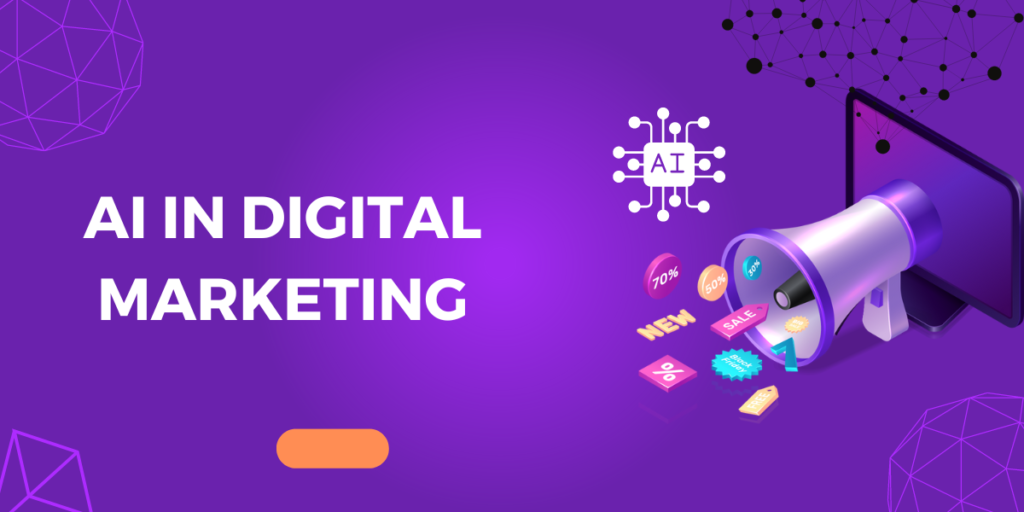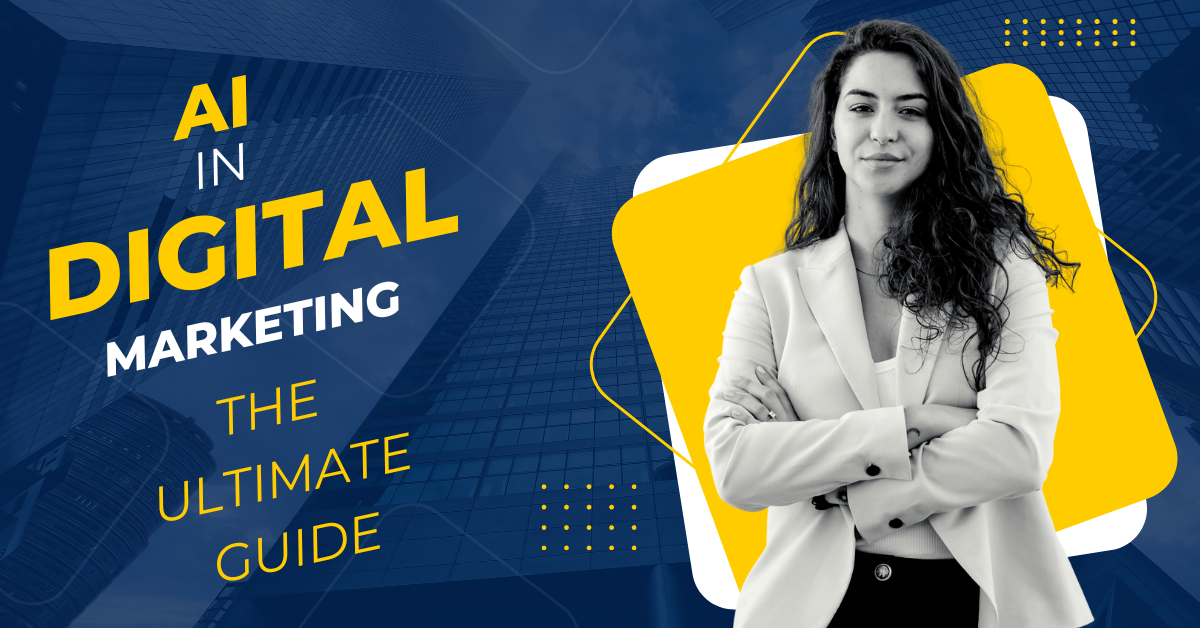The world of digital marketing is always growing, and the trends change quickly. AI technology is now leading the way in digital marketing trends, approaches, and strategies.
Some digital creators are still unsure about how to use AI, while others are already benefiting from it. To keep up with the fast-changing digital trends, it is important to start using AI in digital marketing as soon as possible.
In this article, we will show you how to use AI In Digital Marketing to improve your digital marketing efforts.

What role Play AI in digital marketing?
AI in digital marketing uses smart technology like data collection, natural language processing, machine learning, and data analysis to understand customers and automate marketing tasks.
The main benefit of AI is its ability to quickly gather and analyse large amounts of data to learn about customer behaviour. This information helps businesses respond to and meet customers’ needs based on their actions and preferences. AI can also improve over time by learning from feedback and new data.
Artificial intelligence gives marketers great opportunities to be more effective and personalised. This means customers get relevant content based on their actions on a site, an ad, or a branded message.
However, AI doesn’t replace human roles and efforts. It’s a technology that works alongside humans and enhances their work, but it still needs human skills to be used effectively.
Digital Marketing Tools Powered by AI
While ChatGPT is widely recognized as a leading generative AI tool, numerous other AI tools are making significant impacts in marketing. These tools assist marketers in a range of activities, from generating content to automating tasks, optimising SEO, and enhancing design.
Here are some of the top AI tools available:
1. Jasper – A tool for creating and optimising content to enhance production.
2. Writer – A popular content generation tool that repurposes content and includes an AI writing assistant.
3. Midjourney – Converts natural language prompts into images using generative AI.
4. Optimove – A customer data platform with AI-based marketing features.
5. Zapier – Automates workflows by connecting the apps and services your company uses.
6. Manychat – Uses natural language processing (NLP) to provide interactive customer experiences on platforms like WhatsApp.
7. Evolv.ai – Improves customer experiences in real-time using AI and machine learning algorithms.
8. Surfer SEO – Analyses and compares your pages against top-ranking pages on search engine results pages (SERPs) for on-page optimization.
9. Perplexity – Similar to ChatGPT but better suited for research, as it provides web citations more clearly.
AI Applications in Digital Marketing
AI is super useful across digital platforms. Companies use it for social media campaigns, automating tasks, and digital ads.
It’s not just for certain industries either. Beauty brands like Sephora use AI chatbots to help shoppers, while publishers like The Economist use AI ads to reach readers who might be unsure.
Netflix is a great example of using AI well. They use it to give personalised suggestions based on what users like and do.
How can AI be integrated into digital marketing efforts?
As AI tech becomes easier to use, companies use it for everyday tasks like creating PPC ads or setting up email workflows.
In a survey, most in our Digital Marketing Institute community said AI is changing their roles, with 44% already using it. Among users, 45% saw increased productivity.
- Creating content and visuals is a big job for marketing teams, but AI tools like ChatGPT and Jasper make it easier. They help create content fast, like email subject lines and ad copy. They also personalise content for better audience engagement and can improve influencer marketing campaigns. However, it’s important to check the content to make sure it fits your brand before using it.
- AI chatbots are common for quick customer queries, but AI goes further. It improves customer experiences by personalising content, predicting needs, simplifying purchases, and routing queries efficiently. Many marketing leaders agree AI is changing how customers interact with brands – SEMRush.
- Segmenting customers helps target valuable ones, but it’s time-consuming manually. AI uses algorithms to group customers based on interests or behaviours, allowing for personalised messaging. AI also suggests products and improves offerings based on customer feedback.
- AI has the power to transform SEO by automating tasks like keyword research, content optimization, and meta tag creation. It analyses user behaviour to enhance these processes and can even predict SEO trends and algorithm updates.
Additionally, AI improves voice and visual search optimization through NLP, long-tail keywords, and image metadata. This makes SEO strategies more effective and responsive to user needs.
- Pay-Per-Click (PPC) advertising is a crucial strategy where you pay when someone clicks your ad. It’s effective for attracting new customers, delivering quick results, and allowing easy adjustments.
AI boosts PPC campaigns by optimising:
- Keyword research
- Bidding and targeting
- Ad creation
- Ad scheduling and placement
- Predictive analysis
- Fraud detection
With AI evolving, marketers can expect new ad formats, targeting methods, and measurement tools for PPC. Staying updated is key to PPC success.
- Dealing with loads of data from various sources can overwhelm marketers. But thanks to artificial intelligence (AI), processing vast data quickly becomes possible. This helps marketers understand data better and use past data to predict trends.
AI also spots odd data points and finds patterns. Combining AI with data analysis boosts personalised marketing. The more you know about your customers, the more precise your messaging and strategies can be. In retail, AI helps manage inventory and improve customer service.
ChatGPT excels in data analysis, especially with its Advanced Data Analysis tool. Upload your spreadsheet, and ChatGPT digs deep to reveal valuable insights.
Ultimately, using AI in data analysis leads to sharper business insights that suit your needs.
Email marketing remains a crucial part of any marketing plan as it effectively converts prospects and keeps customers engaged. Integrating AI tools into your email marketing efforts can save time and enhance results.
Using AI in emails allows you to:
- Review email performance to enhance your strategies (e.g., effective subject lines)
- Set up automated workflows based on user actions
- Analyze campaigns and workflows
- Tailor your message to your audience
- Personalize content for different audience groups
- Incorporate dynamic content
- Conduct A/B testing
AI can also help manage your email lists by assessing metrics to determine their quality. You can gain insights into the effectiveness of your email schedule by evaluating each email’s impact and frequency.
What are the key skills frequently utilised in AI-powered digital marketing?
The key to using AI technology effectively is to make sure it fits your role. It’s not just about knowing how to use AI; you need to understand why you’re using it. Does it match your business and career goals? Will it help you reach your organisation’s objectives more efficiently?
You should understand the basics of AI but also explore it deeply to meet your goals, whether that’s getting more leads or improving customer service.
Here are some key technical skills to improve your competency with AI technology:
- Data management
- Data analysis
- Testing
- Content personalization
- Marketing automation
- Process analysis and improvement
Developing these skills with AI can help reduce the fear of using the technology. The more you understand the models and tools, the less intimidating they become!
However, it’s not just about technical skills like coding or content marketing. Companies also look for marketers who can think creatively and focus on finding solutions.
Four important areas to develop broader or soft skills in the context of AI are:
- Strategic thinking
- Innovation
- Creativity
- Agile thinking
These important skills will boost your digital and technical abilities, preparing you for the AI future of marketing.
Pro tip: Use AI tools to help find the right jobs and customise your resume and cover letter for each job description.
We know that artificial intelligence can seem scary and it’s hard to see how it fits into your job. But it shouldn’t be seen as a threat. AI can be a helpful tool in reaching your goals.
AI tools are great for taking care of boring, repetitive, and time-consuming tasks. This frees you up to focus on the more creative and strategic parts of your job.
Learning and using AI will also give you a personal boost. You’ll gain new skills and real experience in a technology that’s becoming more common and valued by companies for hiring and promotions.
This is the helpful you AI In Digital Marketing. AI In Digital Marketing.
FAQ’s
1. How does digital marketing benefit from AI technology?
AI helps improve the customer experience in digital marketing by increasing conversions and keeping customers happy. It makes sure content is personalised and marketing is efficient.
2. How does benefit AI In Digital Marketing efforts?
AI is essential for creating personalised marketing strategies and enhancing customer experience. It allows you to monitor audience behaviour, providing valuable insights to engage them better. For instance, AI can analyse ongoing consumer conversations in real time.
3. Is AI taking over the role of digital marketing?
AI won’t substitute digital marketers or their roles. Instead, it simplifies tasks by automating some manual processes. The pace of change is rapid, and staying current is essential to avoid falling behind.
This is the complete guide of AI In Digital Marketing.
Read More
https://digimarketinggyan.com/how-to-delete-linkedin-account/
https://digimarketinggyan.com/linkedin-video-download-online/
https://digimarketinggyan.com/free-digital-marketing-course-with-certificates-by-google/
https://digimarketinggyan.com/google-ads-credit-how-do-i-claim-for-google-ads-2000-credit/
https://digimarketinggyan.com/top-30-google-ads-interview-questions-and-answers/
https://digimarketinggyan.com/how-can-google-ads-help-you-advance-your-business-goals/
https://digimarketinggyan.com/best-top-10-performance-marketing-agencies-in-india/
https://digimarketinggyan.com/what-is-performance-marketing-strategy/
https://digimarketinggyan.com/how-to-use-chat-gpt-for-free-step-by-step-guide/
https://digimarketinggyan.com/how-to-use-chat-gpt-4-for-free/
https://digimarketinggyan.com/pros-and-cons-of-traditional-and-digital-marketing/
https://digimarketinggyan.com/how-is-the-digital-marketing-different-from-traditional-marketing/
https://digimarketinggyan.com/best-top-seo-company-in-india/
https://digimarketinggyan.com/seo-interview-questions-and-answer/
https://digimarketinggyan.com/is-you-tube-social-media-platform-everything-you-need-to-know/
https://digimarketinggyan.com/top-digital-marketing-agencies-in-bangalore/
https://digimarketinggyan.com/what-is-content-marketing-in-digital-marketing/
https://digimarketinggyan.com/is-digital-marketing-a-good-career/
https://digimarketinggyan.com/top-digital-marketing-companies-in-india/
https://digimarketinggyan.com/how-to-start-a-digital-marketing-agency-in-2024/
https://digimarketinggyan.com/digital-marketing-syllabus-2024/
https://digimarketinggyan.com/mba-in-digital-marketing-requirements-opportunities-and-earnings/
https://digimarketinggyan.com/digital-marketing-salary-in-india/
https://digimarketinggyan.com/advantages-and-disadvantages-of-social-media-for-students/
https://digimarketinggyan.com/what-is-the-digital-marketeting-funnel/
https://digimarketinggyan.com/how-to-earn-money-from-social-media/
https://digimarketinggyan.com/how-to-create-a-3d-social-media-image-in-bing/
https://digimarketinggyan.com/advantages-of-social-media/
https://digimarketinggyan.com/advantages-disadvantages-of-digital-marketing/

